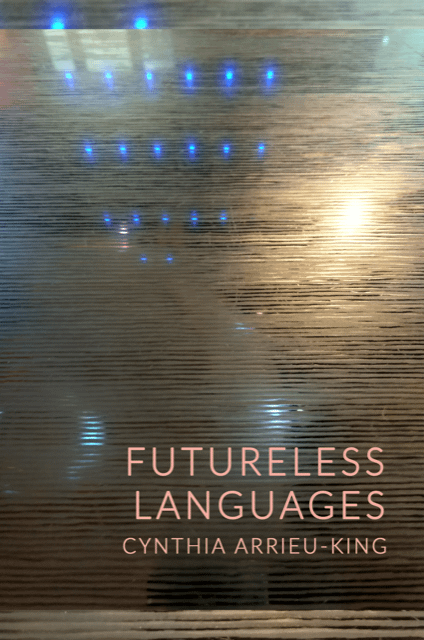Futureless Languages

“This is actually happening” is the title of a poem in the middle of Cynthia Arrieu-King’s new collection, Futureless Languages (Radiator Press 2018), and it encapsulates the feeling of reading the book: a continual reassessment of the reality of the situation is met with continual shock. Yes, Trump is really President. Yes, everything is as bad as it seems. This poem, which is about suicidal thoughts and the silent question many of us have probably asked ourselves, “if I am suicidal, should I kill the President before I kill myself?” probes realistic internal thoughts. We convince our loved one that we’re not really going to do it—we just think about it, like going over a worry stone with our minds.
my bf knowing I got depressed would ask, “Is this something you think about?” “No, no,” I said, “I’m too curious and too procrastinating, I want to see how crazy the future is.” (23)
We see places to do it: the speaker in “This is actually happening” thinks about bridges as possible launch sites: “the person I was with would say they weren’t sure if I was thinking about jumping off.” We try “herbs instead of antidepressants.” The world is strange; we are estranged from it. The mood of suicidality permeates many of the poems in the first half of Futureless Languages, although Arrieu-King also attempts to find ways to cope with the feeling that there is no future:
… what could I do
but imagine purple
light as a bubble
around the city, the
whole country, the
world. (1)… there should be a national holiday where
every person goes out into a field or a cave alone to think (3)
Seemingly written after the advent of a Trump presidency, the reader feels the speaker’s grief for a survivable future. “How to pick / a tense for burdens like how did I get here? What should we do?” Arrieu-King asks, echoing the despair many of us felt after the election (and still feel) (5). She interrogates how language works—or might work—to find a way out of this predicament, mining strategies such as making up imaginary words to entertain children and wondering how such modifications could change colonialism (“empire,” 26), looking for “language [that] can stretch” (“El Anatsui,” 10), learning and translating German (“Futureless Languages,” 4-9), as though if one “spoke more languages… each new language [could be] a window” (10) opening out of the hopeless present. “Languages with no / future tense use / the present instead” (2), but the present Arrieu-King describes, permeated with grief, political disaster, racism, and sexism, is so horrific that one seeks a way out through language. In this sense, Futureless Languages seems to address Theodor Adorno’s famous observation (constraint, challenge), “To write poetry after Auschwitz is barbaric.” We have to change the culture, the syntax and words that led us to the barbarity of our present culture. How do we do that? Arrieu-King uses poetry to scavenge for answers.
A second strand of Arrieu-King’s narrative is the speaker’s personal grief upon the death of her friend. We get a first obscured taste of the severity of this grief in an epigraph from Battlestar Galactica: “All the way to the end.” We don’t throw around phrases like “all the way to the end”—they’re reserved for spouses, close friends, siblings. Highly veiled references to the friend, poet Hillary Gravendyk, who passed away at age 35 in 2014 after an extended illness, occur in the first part of Futureless Languages, but it is not until three-fourths of the way through the book that the casual reader hears Gravendyk, who appears as an epigraph: “I cover one transformation with another.” It is the realization that Hillary, and the speaker’s grief for her, have haunted the entire book, which scrapes out the core of me while reading this book. Most readers of poetry can relate to the social grief of living under Trump’s presidency, but it’s the intensely personal grief of losing a close friend that hurts. By couching one grief inside the other, more social, more easily relatable one, Arrieu-King allows the grief for personal loss to sneak up on and devastate us.
In an insightful recent interview in Tupelo Quarterly, Arrieu-King discusses Futureless Languages and its forthcoming sequel, Continuity (Octopus Books 2019):
So Futureless Languages meditates on the future, the future we witness through another culture’s aftermath of genocide, through the writing on the wall and the feeling of being at the end of something and trying to imagine the future. My spring book Continuity addresses violence in the past and through family and siblings, and visions of the future. I think of the two books as a double album working together to let the past, the present, and the future intermingle and collage rather than be chronological. So rather than flat memory we can see what contrasts, meanings, and evaporating images each makes in conjunction with the other two.
I look forward to seeing how Arrieu-King addresses the family violence and its relationship to social problems Continuity, and how Continuity takes up the trajectory that Futureless Languages sets out.